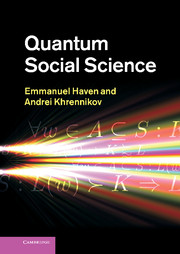Book contents
- Frontmatter
- Dedication
- Contents
- Foreword
- Preface
- Acknowledgements
- List of symbols
- I Physics concepts in social science? A discussion
- II Mathematics and physics preliminaries
- III Quantum probabilistic effects in psychology: basic questions and answers
- IV Other quantum probabilistic effects in economics, finance, and brain sciences
- Glossary of mathematics, physics, and economics/finance terms
- Index
Preface
Published online by Cambridge University Press: 05 July 2013
- Frontmatter
- Dedication
- Contents
- Foreword
- Preface
- Acknowledgements
- List of symbols
- I Physics concepts in social science? A discussion
- II Mathematics and physics preliminaries
- III Quantum probabilistic effects in psychology: basic questions and answers
- IV Other quantum probabilistic effects in economics, finance, and brain sciences
- Glossary of mathematics, physics, and economics/finance terms
- Index
Summary
The current level of specialization of knowledge in a variety of fields of inquiry may make it quite challenging for a researcher to be at the same time a “developer” and a “tester” of a theory. Although a theory can exist without a necessary clear and obvious practical end goal, the ultimate test of the validity of a theory (whether it is situated in the exact or social sciences) will always be how measurement can “conirm” or dislodge a theory.
This book is largely dedicated to the development of a theory. We will be the very first to accept the accusation that the duo “theory-test” is widely absent in this work, and we believe it necessary to make this statement at the very beginning.
This book is about a very counter-intuitive development. We want to use a physics machinery which is meant to explain sub-atomic behavior, in a setting which is at the near opposite end of the size spectrum, i.e. the world as we know and live it through our senses. We may know about the sub-atomic world, but we do not have human experience of the sub-atomic world. Do we have credible and provable stories which can explain how the sub-atomic engages into the mechanics of the statistical macro-world? Probably not.
- Type
- Chapter
- Information
- Quantum Social Science , pp. xvii - xviiiPublisher: Cambridge University PressPrint publication year: 2013



